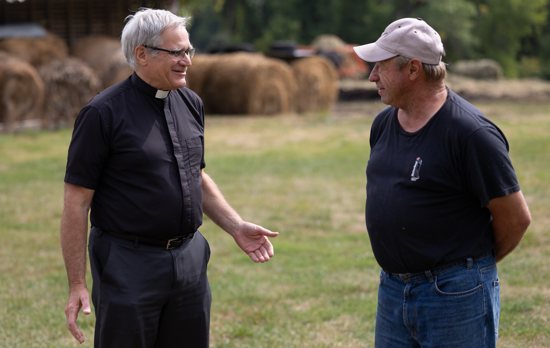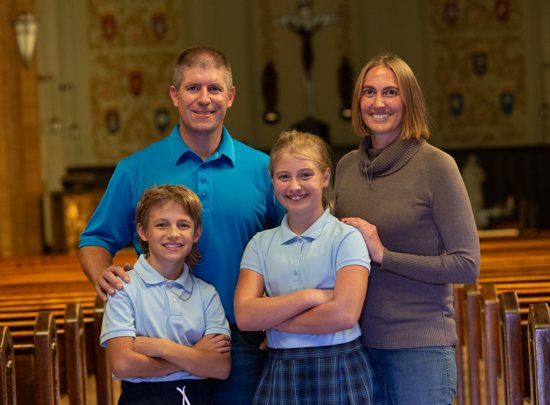
Father Stan Mader, pastor of St. Joseph in Waconia, grew up on a farm and said he always enjoyed having that part of his life.
Having also ministered in rural parishes in the Archdiocese of St. Paul and Minneapolis, Father Mader now shares his rural life experience with seminarians to help prepare them for future ministry in smaller communities out in the country.
People in a small, rural parish might not have a pastor to themselves, Father Mader said. Years back, he served three archdiocesan parishes at the same time: St. John the Baptist in Vermillion, St. Mary in New Trier and St. Mathias in Hampton. All together, the three parishes included about 650 households, he said.
From there, Father Mader moved to St. Ambrose in Woodbury, which had more than 3,400 people, he said. Yet “life isn’t a whole lot different from the pastor’s point of view,” he said.
When he was serving the three rural parishes, Father Mader and the pastor at the time of nearby St. Joseph in Miesville and St. Pius V in Cannon Falls noticed their parishes had some overlapping Mass times. So, they cut some Masses, still giving parishioners a choice in times to attend. Parishioners, meanwhile, would simply bring the collection envelope for their own parish to whichever Mass they attended, and the money would be properly distributed for them.
The two priests also used their parishes’ proximity to host a community event that a small parish likely couldn’t host on its own. That was the case when Father Mader was ministering in Vermillion, New Trier and Hampton.
“We called it the All Saints Music Festival,” Father Mader said. “We would hire a band that no single (parish) could afford and then promoted it and had people from all over the area come,” he said. The joint event also promoted working together and bringing communities together, he said.
Father Mader has offered words of wisdom on rural parish life to seminarians each August, during a week-long “Rural Ministry Practicum” course for Theology II seminarians at the St. Paul Seminary in St. Paul. The course is offered in conjunction with St. Paul-based Catholic Rural Life (CRL).
The practicum includes classroom time and a day trip to a local farm so seminarians “learn first-hand the challenges and opportunities of rural ministry,” according to the seminary. Classroom time focuses on “Catholic social teaching as it relates to agriculture, rural communities and creation,” according to CRL.
Father Mader’s suggestions, gleaned over the years and shared with seminarians, include the importance of knowing the history of the town where they are ministering. Know “what has happened there, who are the old names in the town or the church,” he said. “It’s probably almost one and the same.”
Learn local “death stories,” Father Mader has advised seminarians. Be aware of which families experienced a death by drowning, a farm accident or a home destroyed by a tornado, he said. “Such experiences etch things into that community.”
He recalled serving a small parish when a young man was struck by a car and killed while walking home late at night. “There must have been 60 or 80 young people at the trauma hospital” and over three hours, “we got them all in to see him one last time,” Father Mader said.
“There was just a closeness with the pastor, with me, with that whole bunch of people,” he said.
“One of the great things” when serving a small congregation is the ability to get to know people beyond their name — “really get to know them,” Father Mader said. “That’s something lovely.”
Father Mader also encourages a pastor assigned to a rural area to “do some ride-alongs” with farmers in the combines “because you will be amazed at what these people have to know these days to be a farmer,” from markets to equipment to challenges of starting or continuing in farming and how to remain a small farmer in a corporate world. Father Mader said he suggests asking families where their harvest goes — whether it’s stored on the farm, taken to a grain elevator, or loaded onto trucks immediately upon harvesting and taken to a port of call.
“That’s one way to get to know your parishioners,” he said.
Ask parishioners what it’s like to be a parent, about their dreams and concerns, and how they got into the business of farming and its challenges, Father Mader said. “Show up at the (grain) elevator. You’ll find people come into the elevator that you don’t see any other time.”
Father Mader encourages seminarians to attend baseball games in town, “If you’re sitting in the stands, if you’re showing an interest, you’re trying to find out the common interest,” he said. “And then you can be a person that they trust.”
Father Mader also suggests going to wedding dances. “You don’t have to dance but they’ll kind of appreciate that,” he said. “If you do a good job with the wedding homily — because there are a lot of people who haven’t been to a church for 10 years, and then you said something that was personal or something that touched them in some way, they will talk to you,” he said. “And if that happens a few times in a row, it matters to them.”
Word spreads fast in a small town, Father Mader said. Priests in a large parish can’t be at every burial or other events, as is possible at a small parish, he said.
Funerals at a rural parish can be “enormous,” Father Mader said. When he served at Our Lady of the Lake in Mound, with 1,100 households, he presided at 350 funerals, and about five to 10 had more than 200 attend. When he served the three parishes, he presided at about 100 funerals in six years. “There probably weren’t more than 10 or 16 that didn’t have 200 people at them,” he said. The funeral for the young person killed in the crash drew 450 people to the church and another 300 stood outside, he said.
“It related to so many people,” Father Mader said. “It was (for) an extraordinary young man who had people aged 14 to 80s who would have counted him among their five or 10 best friends.”
Father Mader knew the late Msgr. Ambrose Hayden, whom he called “a great priest of the archdiocese.” Besides working at the chancery, Father Mader said one of Msgr. Hayden’s assignments was serving the Cathedral of St. Paul in St. Paul as its rector.
Father Mader said Msgr. Hayden’s advice “for anybody becoming a priest” was: “Say your prayers and love your people.” And that works, he said.
“You’ve got to love your people.”
TIGHT-KNIT PARISH
Father John Meyer, pastor of St. Timothy in Maple Lake for 11 years, said some parish families go back six generations. He might see a great-grandparent, grandparent and parent at church on the same day, “all the way down to the 2-year-old who was just baptized,” he said.
Some parishioners at the parish in Wright County in the northwest metro are farmers, but a number of professionals and tradespeople also fill the pews. “It’s kind of a wonderful mix,” Father Meyer said.
One blessing of ministering at the parish for Father Meyer is the chance to be immersed in the community, getting to know people and families, and spend time with them in different ways. Beyond church, he might see “half the parish” at sporting events, and often sees parishioners at local restaurants and other venues.
“It’s just a blessing that way,” he said.
Jen Rasset, her husband, Phil, and their two children, ages 9 and 10, are St. Timothy parishioners. The children attend the parish school.

The Rassets live north of town, a spot that Jen said is “definitely out in the country.” But it takes her only about seven minutes to drive her kids to school “depending on how long our one stoplight takes to get through.”
The family lives on the back 40 acres of Phil’s “old farm,” she said, property he bought years ago. The couple operated a dairy farm south of town when they first married.
Living outside of town suits her family, said Jen, 40. Her husband likes to hunt and the family has a large garden, this year with beans, peas, cucumbers, potatoes, tomatoes, carrots, lettuce, radishes, corn and pumpkins. The family — as other families do — sells many of the pumpkins at an event in early October to raise money for the school.
Jen’s family has attended St. Timothy since the early 1900s, and she has lectored there since 10th grade. Her parents are extraordinary ministers of holy Communion. She attended the parish grade school, as did her father, and now her children, the third generation.
Many parishioners have a long history at the parish, Jen said, but it has “lots of new families,” too. “We’re a very involved parish, and I think welcoming,” she said.
“It’s a family,” Jen said of her parish. “Family cheers each other on and is there for each other.”



